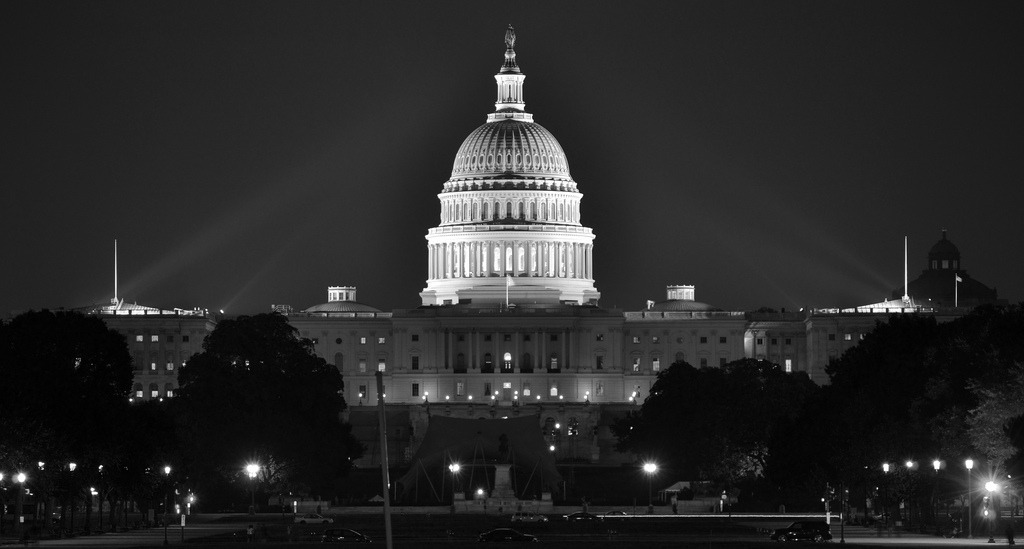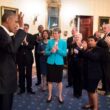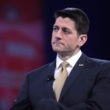Photo Credit: BKL
This was Obama’s “I did it my way” State of the Union.
He had no choice but to go it alone. Not only was Barack Obama the first African-American president, he was the first modern president to face near universal and near unanimous partisan opposition to all his major legislative initiatives.
He was treated like a usurper, or more generously, the prime minister of an opposition party. When his major (or minor) legislative initiatives came to the floor of either chamber, Republicans voted like members of a parliament: lose a major vote and your government falls.
Health care reform
The president began with a riff on progress and the American spirit. Far too high-minded for the reality he’s lived with since the R’s won control of the House.
Our unique strengths as a nation — our optimism and work ethic, our spirit of discovery and innovation, our diversity and commitment to the rule of law — these things give us everything we need to ensure prosperity and security for generations to come.
[W]e thought anew, and acted anew. We made change work for us. . . It’s how we reformed our health care system. . .
“We” was the president and his party: Obama and Nancy Pelosi, who––controlling House Democrats like no other Speaker since “Uncle” Joe Cannon in the early 1900s–– resurrected the Patient Protection and Affordable Care Act weeks after it was declared dead.
Despite Pelosi’s firm hand, 34 Democrats voted against the bill. Yet not one Republican in the House voted for the bill. Is it possible that not one of the 178 Republicans who voted could find a way to cast a “yes” vote?
They couldn’t help themselves. Still can’t. During the SOTU, Speaker (still feels strange to write that) Paul Ryan sat on the dais above the President’s left shoulder, face frozen in a smirk. (Speaker Boehner’s SOTU scowl had more gravitas.)
“We are confronting the President with the hard, honest truth: Obamacare doesn’t work,” Ryan said a week earlier after the House voted to repeal the ACA.
This on the occasion of what, the 66th vote to repeal the president’s landmark health reform bill?
Economic recovery
In fact, it’s that spirit that made the progress of these past seven years possible. It’s how we recovered from the worst economic crisis in generations.
Again, “we” was really “me.”
Before Obama took the oath of office he was working with David Obey, the Wisconsin Democrat who chaired the House Appropriations Committee, to put together an $819 billion stimulus bill.
Republicans were ginning up opposition to it.
Yet with unemployment at 9 percent, the nation sliding toward depression, and $16.4 trillion of U.S. net household wealth lost in black holes of naked default swaps and collateralized debt obligations, not one Republican member of the House voted for the American Recovery and Reinvestment Act of 2009. Eleven House Democrats broke with their party and voted against the stimulus bill. But not one of 188 Republican found any merit in $819 billion in projects that would be spread across all of their districts? Three Republican Senators joined Democrats to pass the stimulus bill by a 61-37 margin.
Banking reform
But after years of record corporate profits, working families won’t get more opportunity or bigger paychecks by letting big banks or big oil or hedge funds make their own rules at the expense of everyone else . . .
The 2009 Dodd-Frank Wall Street Reform and Consumer Protection Act, which imposed modest restraints on the financial institutions whose reckless speculation caused the Great Recession, was not exactly a bipartisan effort. It passed with the votes of 223 House Democrats. Again, not one Republican member of the House, though 27 Democrats joined Republicans voting against it. In the Senate, two Democrats, Wisconsin’s Russ Feingold and Maria Cantwell of Washington, voted no.
National security
That’s why we built a global coalition, with sanctions and principled diplomacy, to prevent a nuclear-armed Iran. As we speak, Iran has rolled back its nuclear program, shipped out its uranium stockpile, and the world has avoided another war.
Remember how things turned out with the president’s major foreign policy achievement? Republican opposition to the nuclear accord the United States, Britain, France, Germany, Russia, and China negotiated with Iran was unprincipled and unprecedented.
Speaker Boehner gave Obama the finger, bypassed the White House, and invited Israeli Prime Minister Benjamin Netanyahu to Washington to argue his (and the Republicans’) brief in the House chamber.
The House didn’t bother to bring up a resolution of disapproval. But Senate Majority Leader Mitch McConnell did, and four Democrats joined a unanimous block of Republican Senators voting to kill the Iran deal. The opponents fell two votes short of the 60 votes needed to break the Democratic filibuster that saved the accord.
As The New York Times wrote after the vote: “Mr. Obama is likely to go down in history as a rare president whose single biggest foreign policy and domestic achievements were won with no Republican votes, a stark departure from his 2008 campaign that was fueled by the promise of bridging Washington’s yawning partisan divide.”
Let’s stick with the Sinatra metaphor: “Regrets, I have a few.”
It’s one of the few regrets of my presidency — that the rancor and suspicion between the parties has gotten worse instead of better. There’s no doubt a president with the gifts of Lincoln or Roosevelt might have better bridged the divide, and I guarantee I’ll keep trying to be better so long as I hold this office.
Don’t bet on the congressional Republicans trying to be better.
Obama’s gentle chiding of a party that congressional scholars Norman Ornstein and Thomas Mann describe as “an insurgent outlier––ideologically extreme; contemptuous of the inherited social and economic policy regime; scornful of compromise; unpersuaded by conventional understanding of facts, evidence and science; and dismissive of the legitimacy of its political opposition . . . all but declaring war on the government” was too generous by a half.
Impolitic as it might have been, he should have found a genteel way to tell them to “shove it.” Or he could have borrowed a line from the too often quotable Texas Governor Rick Perry and told them it’s been a nice ride.
“Adios, Mofos.”
Lou Dubose is the editor of the Washington Spectator.







0 Comments